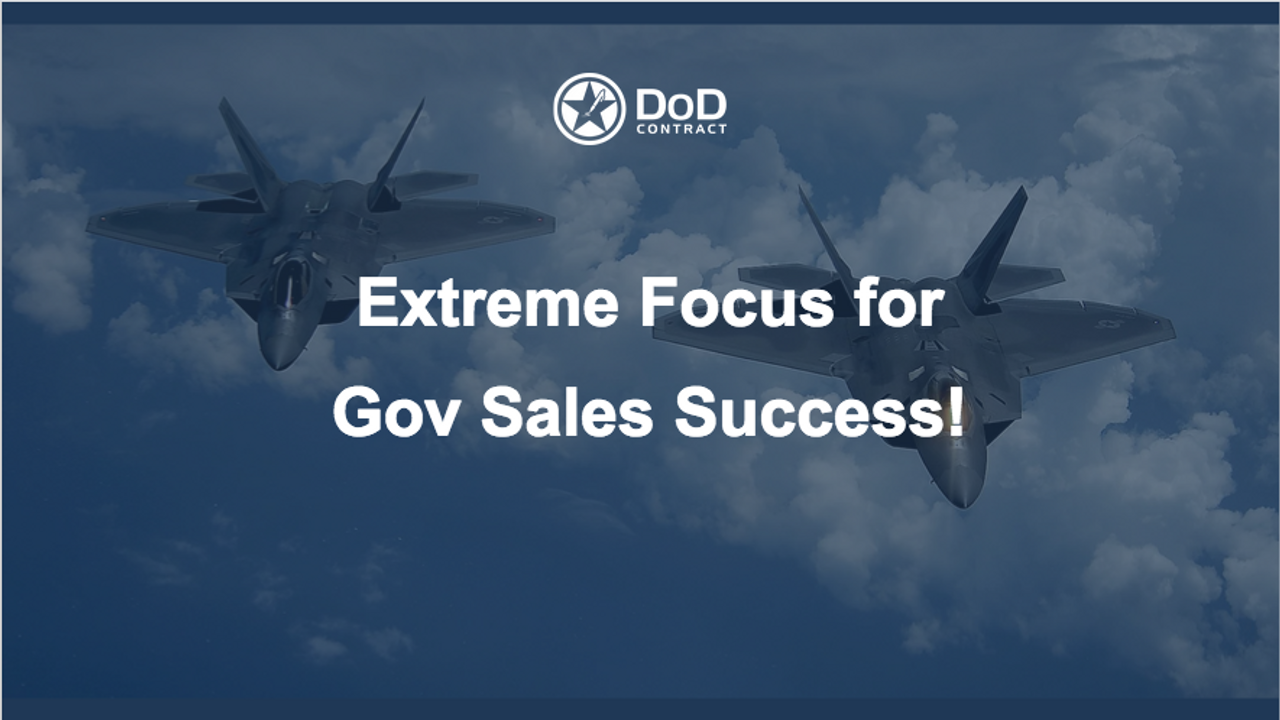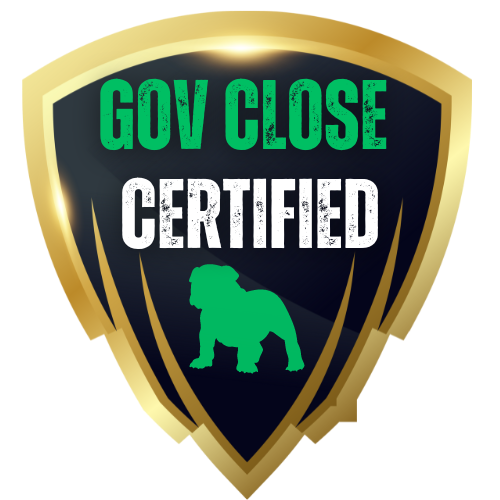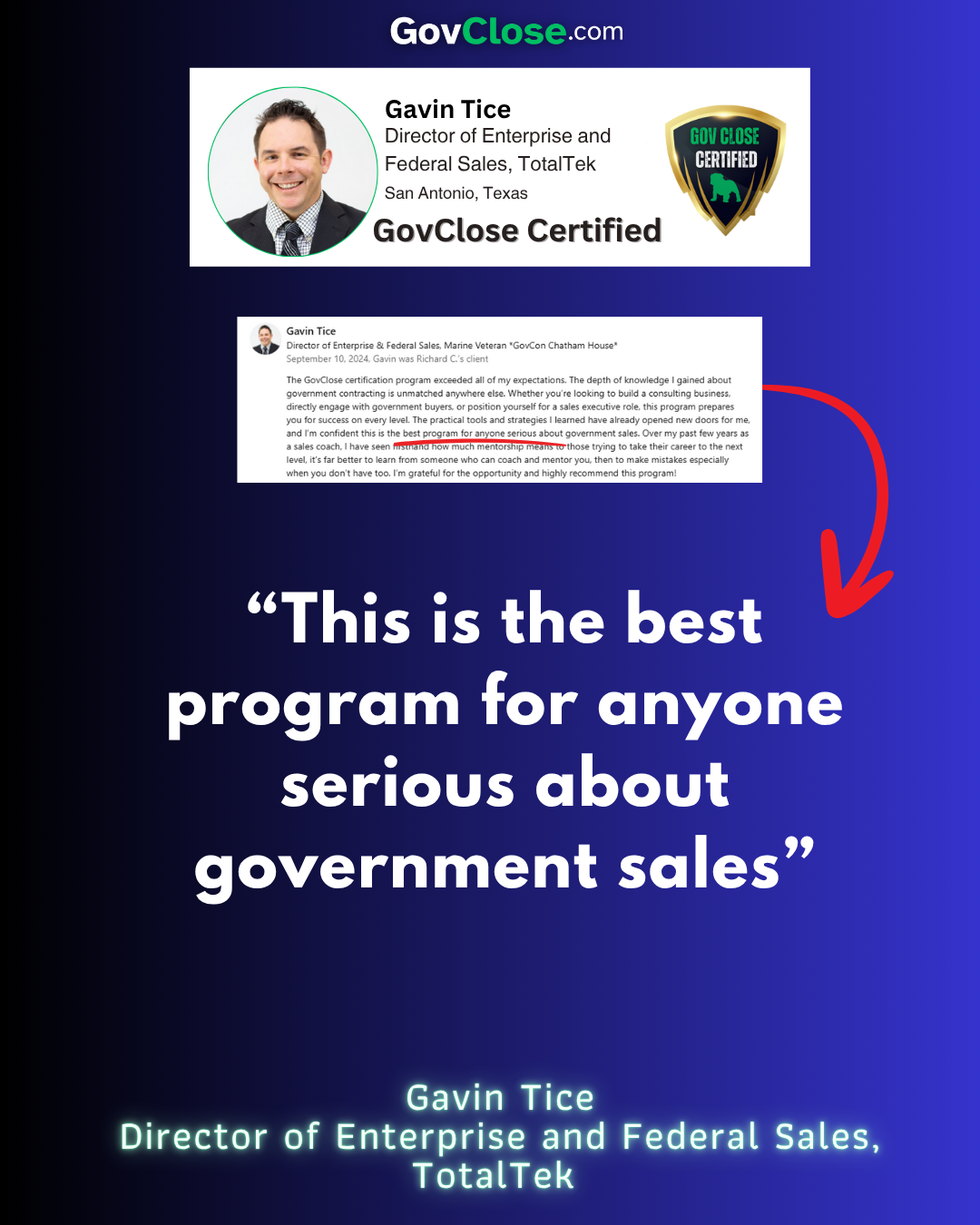
Extreme Focus for Gov Sales Success! (Podcast Transcript)
Sep 05, 2022[01:10] Richard C. Howard: Hey, guys. Richard here with the government sales momentum podcast. Thanks for listening. Today we're going to talk about what I think is the most important aspect of federal sales, which is what is your federal sales strategy. I think that being super focused is probably the most important thing when it comes to obtaining either new or your first federal contract and then keeping that ball rolling. And when I say that's the most important thing, I mean even when I was on the government side working with the Boeing and Lockheed, they were super focused. They're huge. Keep in mind they're going to have business development teams that have hundreds of people with networks already established within the government and even they with the huge resources that they had, they were hyper focused, meaning they knew what offices they wanted to talk to. They knew what efforts were coming up. They usually were constantly making inroads into establishing relationships with the incoming and outgoing contracting officers and program managers. They spent a lot of time understanding what the mission was of each office and what was their problem set, what were they trying to solve so they weren't wasting their time. And this goes to for small businesses that were successful. They weren't wasting their time just writing proposals on everything that came through on Sam.gov. They were focused on finding out about opportunities way before that, before a solicitation ever came up for a proposal. They wanted to know six months, a year or more ahead of time so they could establish a relationship with the program offices and pitch in and give their thoughts and ideas as to what the requirements should be on some of these upcoming projects.
Now, when I am working with a small business or a company that a big company that's been doing it for a while, we almost always go to square one. And what I mean by that is we want to understand who in the government is actually buying what you sell. Right. It's the most important thing you can do, and there are a lot of free resources you can do that. When you understand who's buying what you sell, then you can dig a little bit deeper and see how the offices that are making those purchases are making those purchases. What contract vehicles are they using? Are they using simplified acquisitions? Most of what they sell? Are they putting it out for competitive bid on Sam.gov where it's unrestricted? Do they use a lot of set-asides? There are a lot of different ways to make purchases on the government side and how they're making purchases, how the office that makes purchases for your industry is going to dictate how you approach them. For instance, I've had a lot of companies come to me that went out and got a GSA contract vehicle when they never needed one, because when we went back and did the research, we saw, hey, maybe 10% of the sales in their industry go through GSA, but 90% of them are on either different contract vehicles they're competed. There are partnership and teaming opportunities.
There's a lot of different ways that you can approach this. So if you're seeing 10% GSA, that means you don't need a GSA contract right away. You can start selling to the government and looking at those other avenues. Then maybe you pick up that GSA contract along the road. On the other hand, there are some industries where 90% well, I shouldn't say 90%, but a large majority of the purchases will go through something like a GSA. Right. Or maybe it's another contract vehicle that we're seeing. Maybe you're targeting the Air Force for some type of cyber services, and we're seeing Ciosb Three, which is soon to be Ciosb Four. If we're seeing a lot on those type of contract vehicles, that gives you the idea that, hey, part of your approach is going to be, I need to position ourselves to potentially either on board onto one of those contract vehicles or to partner with a company that's already on them. Before I got into acquisitions, I flew reconnaissance aircraft, and I often tell our clients we would spend usually a day or two just mission planning. This is just for training stories the entire day. So we might mission plan for 810 hours just to fly a four-hour sorting. And it was very important to not only ensure we survived the mission, but we want to accomplish all of our objectives. Right.
So think about flying, which I actually think is less complex than federal sales. You have your aircraft, the status of your aircraft. How is it maintenance wise? Is it good to go? We need to plan the route of flight, right? We need to know where we're actually going to fly. And that's going to dictate? How much fuel do we need? Who are we going to have on board? I flew large aircraft and depending on the mission, I might need certain types of people. I might need linguists. I might need electronic warfare officers. I might need more maintenance technician. Depending on how long the flight was going to be, we wanted to make sure we were set up for success. So depending on that route of flight, we'd have certain people. We'd know what qualifications the pilots were going to need. We wanted to know where we were going to land. Right? We're going to land at the same base we took off from. Are there any notifications on the airfield or do we have emergency airfields we can land on? You see where I'm going with this? There's a lot that goes into a flight plan.
There's a lot more that is actually going to go into your plan for selling to the government. You want to know who you're selling to, right? Where are you going? You need to know how to get there. What kind of contract vehicles are they actually using? How are they making their purchases. You want to know who's involved, like what personnel are you going to need on your team, what type of services would you have to contract out or do yourself in order to go after some of that business? Are you setting up teaming agreements? Do you need someone to write proposals for you? Do you need somebody with a network in the agency that you're trying to sell to? Is there going to be a strong business development piece? There are a lot of questions that you want to answer before you start walking down that road. Many frustrated companies have given up selling to the government because they just would identify solicitations on Sam.gov or whatever bid matching tool they were on. They're writing proposals and they're not winning anything. Or they go out and they get that GSA contract vehicle thinking work is going to come in and it doesn't. But for the companies that are hyper focused, they do the planning ahead of time and they know, I'm going to sell it to this agency, this office. I'm going to go to these meetings that I can just set up because they're either online, virtual webinars, or maybe there's a way to contact a contracting officer, program manager, set up some meetings to talk about some upcoming efforts. You're setting those meetings up. You're identifying opportunities in those offices before their RFPs. You're looking at RFIs and sources sock, maybe you're setting up teaming relationships with companies that are already selling to those offices. You can see there's a lot you can do to be hyper focused and targeted. So when you walk in there and you're talking to the government rep, you know exactly what's going on. You've been through the webinars, you understand their mission. You know what their problem is. You know where you fit in and you don't exaggerate what you can do, you know what you can't do and for what you can't do. You have teaming relationships with companies you can partner with to provide a solid solution. You're on the contract vehicle that they want to use. These are all things that are going to set you up for success.
So again, I just want to give you my thoughts on what successful mission planning for selling to the government actually looks like. And that's just touching on it. We'd be happy to talk to you. You can always reach out to us. We have an amazing group of professionals that were on the government side of things at one point are now helping companies sell to the government. A lot of different specialties out there. Federal sales is a huge topic area that if you're a contracting officer in the government, this is somebody that could spend 20 or 30 years just learning about certain parts of putting companies on contract for the government. Right. Program managers say the same thing. They might be just focused on specific parts of program management. You have costs, you have money, people. When you think about the fact that people have spent decades learning just specific parts of federal acquisitions, it can be overwhelming for a company. But really what my message to you would be, you don't need to understand all that. You only need to understand the narrow little piece of this that applies to you and your business. And there are people out there you don't have to break the bank to that can advise you on your best approaches and how to either manage your contracts, write your proposals, establish a business development relationship with some of these offices. List goes on. But again, I want to give you my thoughts there because it's been coming up a lot in our consultations. Hope you enjoyed this podcast. We have a lot of great interviews scheduled to come up over the next couple of months and I think you're going to find it very valuable. Don't hesitate to reach out. You can go to our website. Ricky here did enjoy the episode. Check, subscribe to the podcast and take care.
[09:56] Richard C. Howard: It's very much appreciated. If you're interested in selling products and services to the Department of Defense, I have something for you that you're not going to find anywhere else in the world. The team and I created a program that takes everything you need to win defense contracts and put it into one place. Up until now, only large defense companies and a small amount of people in the know have had access to how products and services are really sold to the Department of Defense. I've taken all of that information and put it in a step-by-step training module that shows you how to consistently sell to the US military. If you join our membership not only do you get the model, but you get weekly sessions with former DOD acquisitions officers for training and guidance to answer your questions and a community of like minded business owners that want to partner on different opportunities to bid for subcontracting and teaming, or just to discuss general strategy on how to sell to the DOD. You'll have access to every course I've created, every coaching session I've ever recorded and every interview with an acquisition professional that I've ever conducted. And we covered topics that range from defense sales planning and competitor analysis to SBIR and STTR foreign military sales. The list goes on. Go to Dodcontract.com if you are interested and I would love to see you in the membership.
If you enjoyed this episode, you can also check out my podcast on the Judo & Art of Managing Government Contracts to know more on how you can manage your current contract with the US government.
If you have any questions, you can reach out to us here and we will get back to you as soon as we can.
Turn Government Contracting Knowledge Into Income
This isn’t a course. It’s a certification and implementation system to help you build a consulting business, land a high-paying sales role, or scale your own company in federal contracting.
We hate SPAM. We will never sell your information, for any reason.


